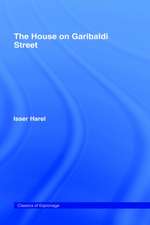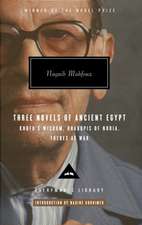The Cairo Trilogy
Autor Naguib Mahfouzen Limba Engleză Hardback – 28 sep 2001
| Toate formatele și edițiile | Preț | Express |
|---|---|---|
| Hardback (2) | 182.39 lei 26-32 zile | +81.37 lei 7-13 zile |
| EVERYMAN – 28 sep 2001 | 182.39 lei 26-32 zile | +81.37 lei 7-13 zile |
| Everyman's Library – 30 sep 2001 | 290.10 lei 3-5 săpt. |
Preț: 182.39 lei
Preț vechi: 210.12 lei
-13% Nou
34.90€ • 36.54$ • 28.88£
Carte disponibilă
Livrare economică 20-26 martie
Livrare express 01-07 martie pentru 91.36 lei
Specificații
ISBN-10: 1857152484
Pagini: 1376
Dimensiuni: 142 x 210 x 62 mm
Greutate: 1.22 kg
Editura: EVERYMAN
Locul publicării:United Kingdom
Descriere
Palace Walk, Palace of Desire and Sugar Street, published in Arabic in 1956-7 and translated into English in 1990, are the three novels which first presented Egyptian urban life to the English-speaking world. Said to have been inspired by Galsworthy's The Forsyte Saga (and Mahfouz, like Galsworthy, won the Nobel Prize for literature) it has an additional depth of characterization and insight which remind one more of Mann's Buddenbrooks. The novels follow the history between 1917 and 1944 of the Cairo family of businessman al-Sayyid Ahmad Abd al-Jawad - the totally chauvinistic father himself, his subjugated, timid, sensitive wife, and his five children - two daughters and three sons, all under his hand but each a distinct personality who fights in his or her own way towards the opportunity for self-expression in an often oppressive Muslim society. All this is set against the political background of the conflict between the Ottoman Caliphate and its repressive tradition, and the battle for a new independent nation - beginning with the 1919 nationalist revolution and ending with the mass arrest of political activists in 1944. The characters are brilliantly and sympathetically invented: the imperious father with his secret life of drinking and whoring, his unassertive but strong mother, his three sons - one idealistic, one dissolute, one a searching intellectual - and repressed daughters. With its vivid picture of Egyptian city life which still clings to age-old customs - folk tales and songs, popular tunes, proverbs, traditions - it is not only a panoramic picture of a particular family in a singular place during exciting and dangerous years but, a 'great' book in every sense. (Kirkus UK)
Notă biografică
Recenzii
“Luminous…All the magic, mystery and suffering of Egypt in the 1920s are conveyed on a human scale.” –New York Times Book Review
“The alleys, the houses, the palaces and mosques and the people who live among them are evoked as vividly as the streets of London were conjured up by Dickens.” –Newsweek
“A masterful kaleidoscope of emotions, ideas and perspective. Mahfouz has captured a family and its homeland at one gloriously varied moment in a cycle.” –Newsday
“Mahfouz presents us with a different concept of the world and makes it real. His genius is not just that he shows us Egyptian colonial society in all its complexity; it is that he makes us look through the vision of his vivid characters and see people and ideas that no longer seem alien.” –Philadelphia Inquirer


















